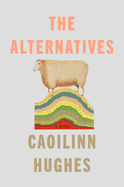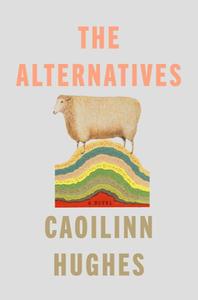
 With talented writers like Sally Rooney and Colin Barrett among them, there's no shortage of fine young Irish novelists working today. And any such list must include Caoilinn Hughes, whose third novel in only six years, The Alternatives, is yet another example of her gift for illuminating the dark places in the lives of dysfunctional, but deeply sympathetic, families.
With talented writers like Sally Rooney and Colin Barrett among them, there's no shortage of fine young Irish novelists working today. And any such list must include Caoilinn Hughes, whose third novel in only six years, The Alternatives, is yet another example of her gift for illuminating the dark places in the lives of dysfunctional, but deeply sympathetic, families.
Hughes (Orchid & the Wasp; The Wild Laughter) takes as her subject the four Flattery sisters. Three are PhDs and college professors: Olwen, an earth scientist at the University of Galway who's driven by her concern over climate change; Rhona, a political scientist at Trinity College Dublin, and one of the world's leading scholars of deliberative democracy; and Nell, the youngest, a struggling adjunct philosophy professor at three colleges in Connecticut. The fourth, Maeve, is a celebrity chef and cookbook author living on a houseboat in London. She and Nell collaborate on Instagram videos entitled "Meals and Meditations" that have attracted a large, enthusiastic following.
Rhona, Maeve, and Nell unite when Olwen disappears on her bicycle one rainy October evening, leaving behind her partner and his two young sons. They track her to a farmhouse in the north of Ireland, where she's established a life off the grid as her reaction to onrushing environmental destruction, and it's there that the quartet excavate some of the remains of their collective past, including their shared grief over the deaths of their parents when they were teenagers.
But as Hughes reveals in a story that daringly features a two-act drama amid its prose narrative, the other Flattery women, all now in their 30s, are dealing with equally vexing present-day problems. Nell, who is struggling to escape poverty by ascending to the tenure track, suffers from a mysterious ailment that's robbing her of feeling in her lower extremities. Maeve has to respond to a publisher who's demanding the return of its advance on her somber third book about cooking in a time of food shortages, while trying to decide whether to ask Halim, an undocumented immigrant mime who lives in a tent on her houseboat, to be the sperm donor for her first child. And Rhona wrestles with the challenges of enlisting ordinary people to effect political change, most notably in Northern Ireland.
If all this sounds a bit chaotic, it's anything but that in Hughes's assured hands. The Flattery sisters, a "faulty batch," as Olwen regards herself and her siblings in all their charming chaos, are vivid and appealing characters in this bighearted, wise, and frequently sharply funny novel. --Harvey Freedenberg, freelance reviewer
Shelf Talker: This novel about four Irish sisters considering their pasts and pondering the future showcases the author's gift for illuminating the dark places in dysfunctional, but deeply sympathetic, families.

